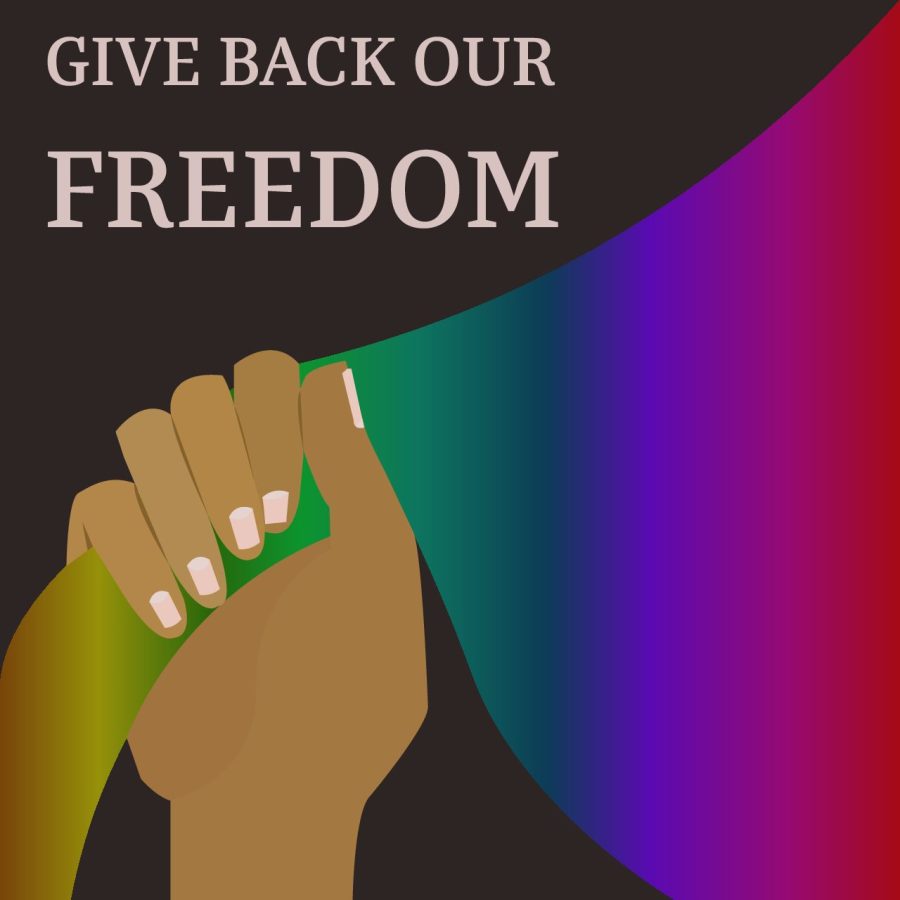Editorial — Tennessee drag ban is direct attack on LGBTQ+ community
April 6, 2023
In an era when LGBTQ+ visibility and acceptance seemed to be on an upward trend, legislators in Tennessee decided to create and pass a bill that deliberately targets the community — particularly that of drag queens.
The bill, which is less than two pages in length, outlaws what they defined as “adult cabaret performance[s]” in public or in the presence of minors. Male and female impersonators are listed alongside topless dancers, exotic dancers and strippers as those who “provide entertainment that appeals to a prurient interest.”
The penalties for violating the new law are harsh, with a first offense resulting in a misdemeanor charge with up to a $2,500 fine and a year in jail. Repeat offenders will face felony charges, which are punishable by up to six years in jail.
The bill was ultimately signed into law by Republican Gov. Bill Lee at the beginning of March, with nine other Republican-led states introducing similar anti-drag bills in its wake.
This bill is upsetting and dangerous for a number of reasons. It is apparent that those who drafted and voted in favor of this bill do not fully comprehend the art form of drag. To categorize all drag shows as “adult cabaret performance[s]” is a gross oversimplification of the community and the different talents that exist within it.
Many drag shows operate like a standard concert, with performers lip-syncing over a popular track or even performing original music live. Other times, the shows are more dramatic and scripted, as if being performed on Broadway. Queens may even show off their unique talents, whether that be gymnastics, aerial dances or stand-up comedy sets.
And that is only scratching the surface, but it proves the point that there are so many different styles of drag. Do some drag performances have adult themes? Absolutely. But these performances are advertised with a warning and often held in spaces for adults only, like bars and clubs.
An all-encompassing drag ban is equivalent to banning all other forms of entertainment that are not age appropriate. But instead of outlawing music that contains swear words or films that display graphic content, we have developed a warning system that informs consumers about what they are getting themselves into. Drag shows already do this.
Unfortunately, this bill is more than just an attack on drag queens. The wording of the bill is deliberately vague, with lawmakers choosing to say “male and female impersonators” instead of “drag queens/drag kings” so they could potentially criminalize the existence of transgender and gender-non-conforming (GNC) people.
This is not a stretch either, for several high-profile politicians have openly stated that trans and GNC people are illegitimate and should not be provided the gender-affirming care they need. Tennessee already voted in favor of banning medical providers from doing so.
Tennessee already bans obscenity in front of minors as well, so this entire drag ban feels like a political stunt that is being used to distract Tennesseans from the real issues happening in their state. In comparison to all other states, with #1 being the best and #50 being the worst, Tennessee currently ranks #33 for education, #43 for both pollution levels and public health, and — most ironically — #45 for overall public safety.
The LGBTQ+ community has fought for the right to freely express themselves for too long, and the further prolongment of that fight is a clear sign of hatred. This hatred stems from a refusal to understand a marginalized group that is different from the heteronormative society we currently exist in.
Is it so hard to understand that members of the LGBTQ+ community just want to be themselves, open and free, without fear of harm? It is a luxury and privilege that all cis, straight individuals enjoy, so why can’t they?
Thankfully, the fight to protect drag queens and their right to perform in Tennessee is glistening with hope, for a federal judge temporarily blocked the discriminatory bill from going into effect on the grounds that it violates the performers’ First Amendment right to free speech.
When it comes down to it, drag performances are not a new phenomenon. We have been surrounded by the art form for our entire lives, with several examples of cis, straight men doing drag (or female impersonation) on the big screen — Robin Williams (Mrs. Doubtfire), Tyler Perry (Madea) and John Travolta (Hairspray) being just a few.
If it is okay when they do it, is it only wrong, immoral or inappropriate when LGBTQ+ people do it?
Editor’s Note: The North Wind is committed to offering a free and open public forum of ideas, publishing a wide range of viewpoints to accurately represent the NMU student body. This is an editorial, written by the North Wind Editorial Board in its entirety. It reflects the majority views of the individuals who make up the editorial staff of the North Wind. It is the policy of the Editorial Board not to endorse candidates for any political office, in order to avoid aligning this public forum with particular political organizations.


























